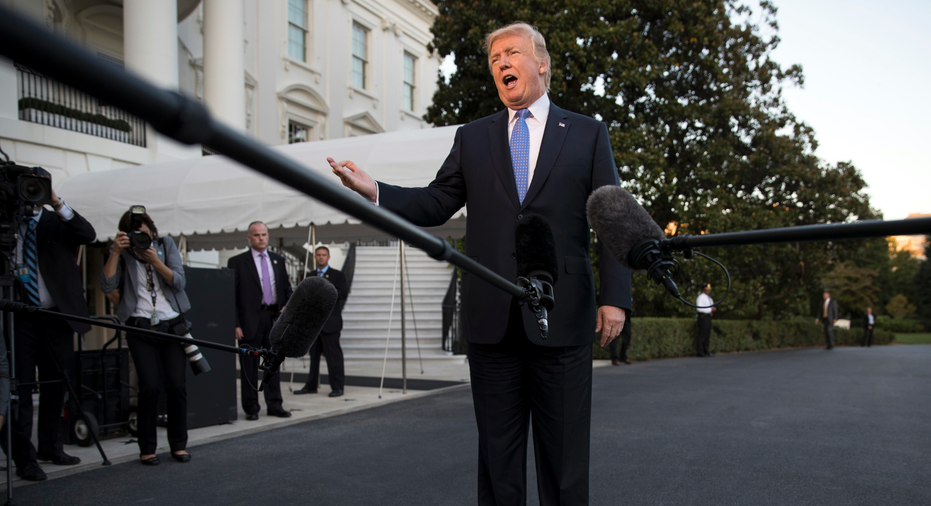Trump, an uneven ally for GOP, tests his influence on taxes

WASHINGTON – When President Donald Trump announced plans to go to Indiana Wednesday to sell the GOP tax overhaul plan, party leaders cheered his engagement on the high-stakes issue. When the White House said one of Trump's traveling companions would be Indiana's Democratic Sen. Joe Donnelly — a top target in next year's midterm elections — the hopes turned to head-smacking disbelief.
The episode underscores the extent to which Trump has been an uneven — or at best, unpredictable — ally for his party, both on policy and politics. Time and again, Trump has complained about his party as loudly as he vents about Democrats, or shifted his position as Republicans leaned on him for support. The dysfunctional dynamic now stands at the center of Republicans' last chance this year to prove they can pass major legislation — a sweeping, multitrillion-dollar tax cut that GOP officials believe is crucial to the party maintaining its congressional majority in the midterms.
"Literally, if they can't do this, they can't do anything," said Tim Pawlenty, the former Republican governor of Minnesota and head of the Financial Services Roundtable, a bank lobbying group. Trump is a constructive force in the effort, Pawlenty said, "if he can stay focused and stay on message."
The president this week repeatedly demonstrated his sometimes fickle friendship. As the party licked its wounds over the failure of its health care legislation, he floated working with Democrats on that issue, something he's already done on immigration and spending matters. While he agreed to requests from Senate Majority Leader Mitch McConnell to campaign for the establishment-backed candidate in Alabama's GOP primary, he undercut his impact by pondering aloud whether he'd made a mistake. Luther Strange, the candidate Trump backed, lost Tuesday to firebrand jurist Roy Moore by nine points.
Trump quickly endorsed Moore and his tweets backing Strange were deleted.
A former Democrat who is ideologically flexible, Trump has been an awkward partner for Republican leaders since the start of his political rise. But McConnell and House Speaker Paul Ryan have privately tried to rally their members during low points in the presidency by reminding them that Trump will sign legislation a Democratic occupant of the Oval Office would not — despite the fact that the GOP Congress hasn't had any major bills to send to Trump's desk.
The White House has promised GOP leaders that Trump will indeed travel the country selling the tax legislation. Trump advisers have told congressional lawmakers and aides that the president is more deeply engaged on taxes than on any other domestic policy push during his tenure, according to a Republican official who was one of six GOP aides and operatives who insisted on anonymity in order to discuss the president's standing with his party.
But Republicans have heard similar promises from the White House before. Trump ultimately invested little time and energy trying to rally public support behind two GOP bids to overhaul the nation's health care system. As the party scrambled to salvage last-ditch legislation this week, Trump seemed more focused on stirring up controversy about protests during the national anthem by NFL players. McConnell pulled the bill without holding a vote.
Sara Fagen, a Republican strategist who served as White House political director for President George W. Bush, said that for Trump to be a successful advocate for tax reform, he'll have to repeatedly rally Americans behind the effort and personalize the impact of the tax changes for the middle class.
"If he just sits in the upper floor of the White House after 7 p.m. and fires off tweets, that's not going to help," Fagen said.
Trump's event in Indiana Wednesday got the campaign off to a conventional start. Standing in front of a massive American flag, the president largely stuck to script and talked about the tax plan with specificity. He called on both parties to join forces on an overhaul, despite the fact that the blueprint he outlined was negotiated by Republicans alone.
"Tax reform has not historically been a partisan issue, and it does not have to be a partisan issue today," Trump said. "There is no reason that Democrats and Republicans in Congress should not come together to deliver this giant win for the American people."
GOP operatives working on the 2018 midterms were miffed by the president's decision to invite Donnelly, one of the most vulnerable Democratic incumbents, to fly on Air Force One. Donnelly is fighting to keep his seat in a state Trump won in November by nearly 20 points, and to win, he'll likely need to prove to voters that he doesn't simply toe the Democratic Party line.
It's the second time Trump has given a vulnerable Democrat an opportunity to highlight bipartisan credentials. Earlier this month, he traveled to North Dakota with home state Sen. Heidi Heitkamp, another at-risk Democrat in 2018. He invited Heitkamp to join him onstage and called her a "good woman."
On Wednesday, Trump thanked Donnelly for joining him in the rally, but left the senator with a less campaign advertisement-ready endorsement.
"If Senator Donnelly doesn't approve it, because you know he's on the other side, we will come here and we will campaign against him like you wouldn't believe," Trump said of Donnelly and the tax package.
Donnelly didn't appear to flinch under that threat. He released a statement following the event that said he didn't work for "President Trump or any political party" and criticized the tax blueprint for "missing many details that will be critical to determining whether working and middle-class families truly stand to benefit."
_
Follow Julie Pace at http://twitter.com/jpaceDC



















